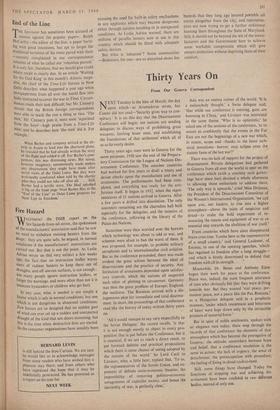Thirty Years On
From Our Geneva Correspondent
NEXT Tuesday is the Ides of March; the day ppon which—as Artemidorus wrote, but Caesar did not read—'Security gives way to con- spiracy.' It is on this day that the Disarmament Conference will begin; ten nations are sending delegates to discuss ways of prohibiting great weapons, limiting lesser ones, and establishing the foundations of that settlement.' which all of us so fervently desire.
Thirty years ago, men were in Geneva for the same purposes. 1930 saw the end of the Prepara- tory Commission for the League of Nations Dis- armament Conference. The member countries had worked for five years to draft a treaty and devise checks upon the manufacture and use of armaments. The preliminaries had been com- pleted, and everything was ready for the con- ference itself. It began in 1932, when the repre- sentatives of 61 nations arrived in Geneva. After a few years it drifted into dissolution. The only souvenirs remaining are the charmless hall built especially for the delegates, and the minutes of the conference, yellowing in the library of the Palais des Nations.
Statesmen 'were then worried over the horrors which technology was about to add to war, and schemes were afoot to ban the worst of them. It was proposed, for example, to prohibit military aeroplanes and to internationalise civil aviation. But as the conference proceeded, there was made evident the great schism between the ideal of disarmament and the practice of security. Any limitation of armaments depended upon satisfac- tory controls, which the nations all suspected each other of plotting to circumvent. Germany was then the great problem of Europe; England, .the mediator. The Russians arrived with a dis- ingenuous plan for immediate and total disarma- ment. In short, the proceedings of that conference read like the history of today. written thirty years on.
`All I would venture to say very respectfully to the Soviet Delegate,' the record recalls, 'is that it is not enough merely to object to every pro- position that is put before the Conference, but it is essential, if we are to reach a direct result, to put forward definite and practical propositions which there is some chance of seeing adopted by the nations of the world:' So Lord Cecil to Litvinov, who, a little later, replied that, `To us, the representatives of the Soviet Union, and ex- ponents of definite socio-economic theories, the impossibility of removing politico-economic antagonisms of capitalist society, and hence the inevitably of war, is perfectly clear.' Asia was an uneasy corner of the world. 'It is a melancholy thought,' a Swiss delegate said, `that while our conference is meeting, guns are booming in China,' and Litvinov was interested in the same theme. 'Who is so optimistic,' he asked one of the sessions of the conference, 'as to assure us confidently that the events in the Far East are not the beginnings of a new war which, in extent, scope and—thanks to the latest tech- nical inventions—horror, may eclipse even the sinister fame of the last war?'
There was no lack of support for the project of disarmament. Private delegations had gathered in Geneva from all over the world to spur on the conference which (with a courtesy such gather- ings have since lost) devoted a whole afternoon to allowing those enthusiasts to address them. 'The only way is upwards,' cried Miss Drijman, the President of the Disarmament Committee of the Women's International Organisation, 'we call upon you, our leaders, to rise into a higher atmosphere—above the mists of suspicion and dread—to make the bold experiment of re- nouncing the means and equipment of war as an essential step towards the abolition of war itself.'
From countries which have since disappeared brave cries rose. 'I come here as the representative of a small country,' said General Laidoner, of Estonia, in one of the opening speeches, 'which has regained its freedom after a long struggle— and which is firmly determined to defend that freedom with all its strength. . .
Meanwhile, Dr. Benes and Anthony Eden began their work for peace at the conference. Peace was, indeed, the most frequent utterance of men who obviously felt that they were drifting towards war. But they wanted 'real peace, per.- manent peace, not a peace like the Pax Romana,' as a Hungarian delegate said in a prophetic moment, 'under which resentment and bitterness of heart were kept down only by the invincible pressure of material force.'
But in spite of noble sentiments, spoken with an elegance rare today, there seep through the records of that conference the elements of that atmosphere which has become the prerogative of Geneva : the attitude, somewhere between hope and belief, that a conference resolution is the same as action; the lack of urgency, the sense of detachment; the preoccupation with procedure; the feeling of living in cloud-cuckoo-land.
Still, some things have changed. Today the functions of stopping war and achieving dis- armament have been confided to two different bodies, instead of only one.










































 Previous page
Previous page